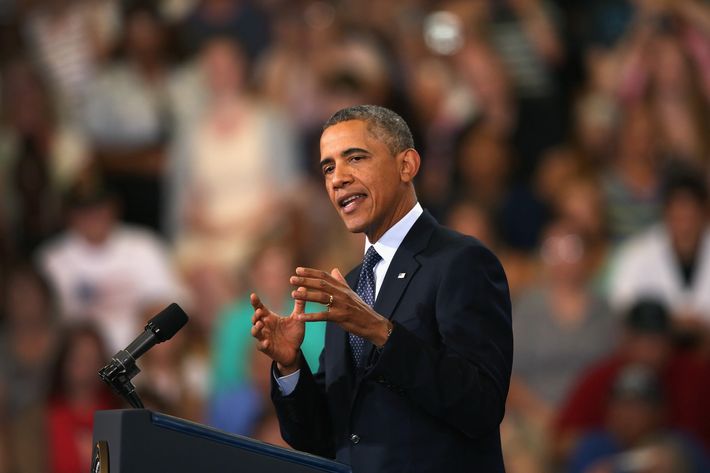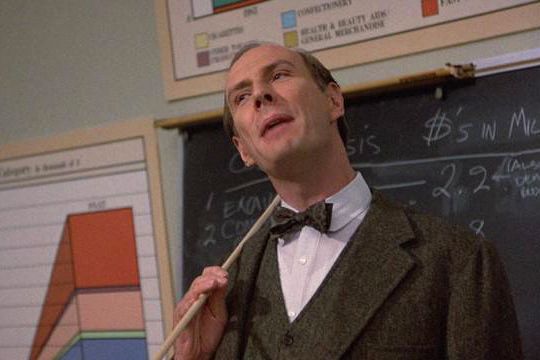
Probably the most important policy idea in President Obama’s economic speech yesterday was his commitment to control the rising cost of college tuition. Health care is a good analogy to think about this. During Obama’s first term, he became convinced that simply expanding access to the uninsured couldn’t work as long as medical costs kept spiraling out of control, and this commitment forced him to support a wide range of unpopular cost-control measures, some of which put him crossways with members of his own party. (Some unions are still mad about health care reform for that reason.)
Obama’s college agenda started off as a classic Democratic agenda of increasing access by making student loans more generous. But he’s come to think of college tuition costs as essentially the same problem. Yesterday’s speech included a pretty long riff on this issue, which mostly escaped attention:
Families and taxpayers can’t just keep paying more and more and more into an undisciplined system where costs just keep on going up and up and up. We’ll never have enough loan money, we’ll never have enough grant money to keep up with costs that are going up five, six, seven percent a year. We’ve got to get more out of what we pay for.
Now, some colleges are testing new approaches to shorten the path to a degree or blending teaching with online learning to help students master material and earn credits in less time. And some states are testing new ways to fund college based not just on how many students enroll but how many of them graduate, how well do they do.

Obama pledged to unveil most of the details in a subsequent speech. Some elements will probably involve executive action, including encouraging colleges to take steps on their own. (Obama promised to “call college presidents.”) The ultimate solution is probably going to require some kind of legislation, and David Wessel previews some good ideas along these lines.
But this agenda is also likely to create even deeper fissures within the Democratic agenda than cost control did. After all, there isn’t a much more loyal Democratic constituency than people who work in higher education.
Jonathan Rees’s polemic in Slate against MOOCs today is an important preview of the coming fight within the Democratic base. MOOC stands for “massive open online course,” which is a super-cheap way to provide college instruction. It’s one of the tools Obama referenced as a solution to the tuition crisis. The concept is extremely new, and the trick is to develop it in such a way that you can weed out cheating, and ensure that students really learn. If you can do that, then prestigious universities can start providing degrees for their online courses, and you would have a powerful, extremely affordable new path for cash-strapped kids to obtain the benefits of a college degree.
Rees argues that this is a terrible idea that can’t possibly work, and urges his fellow academics to fight it with every fiber of their being. Why do we know it’s a terrible idea? Here is his entire explanation:
How do you teach tens of thousands of people anything at once? You don’t. What you can do over the Internet this way is deliver information, but that’s not education. Education, as any real teacher will tell you, involves more than just transmitting facts. It means teaching students what to do with those facts, as well as the skills they need to go out and learn new information themselves.
But, uh – are we sure the only way to teach people what to do with facts is face-to-face? This seems like something that could at least conceivably be taught to more than one person at once. I can remember lots of professors teaching me what to do with facts via lectures in extremely large auditoriums, which is not that different than a lecture you watch online. Nobody claims that the technical barrier has been solved, but it’s amazing that Rees is already declaring it unsolvable.
After this brief assertion that online college can never work, Rees proceeds to the guts of his argument: it’s bad for college professors. Rees writes, “the beauty of MOOCs is that they provide an easy opportunity to drastically cut labor costs by firing existing faculty members or simply hiring poorly trained ones — whom they won’t have to pay well — to help administer the class.” Well, yeah. Given that college is unbelievably expensive, isn’t that a good thing? No, he says, because “Professors, believe it or not, are people, too. They have families and health problems and student loans of their own.”

That is sad. College professors are good people, and nobody wants to hurt them. At the same time, designing a higher education system around maintaining living standards for college professors is an insane idea. The goal of the system ought to be making higher education effective and affordable for students. Rees waxes poetic about the joys of in-person liberal education, and I greatly enjoyed my classic college experience, with the gorgeous campus green and intramural basketball and watching campus protestors say interestingly crazy stuff at rallies. But insisting that’s the only way a student ought to be able to get a degree, in an economy where a college degree is necessary for a middle-class life, is to doom the children of non-affluent families to crushing college debt, or to lock them out of upward mobility altogether.
Rees urges his fellow academics: “It’s time for us non-superprofessors to forcefully explain to our newly famous colleagues how their MOOCs are already adversely affecting the terms and conditions of our employment.” Forcefully! Perhaps some of the students who can’t afford to get a college degree should forcefully explain their plight to him.






























